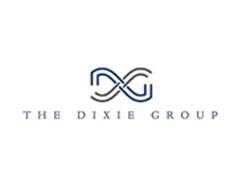Dixie Group Reports Q1 Sales & Revenue Losses
Dalton, GA, May 3, 2019-The Dixie Group reported financial results a Q1 2019 YOY net sales decrease of 10.4%.
For Q1 2019, the company had a loss from continuing operations of $6.6 million, compared to a loss of $2.9 million in Q1 2018.
Commenting on the results, Daniel K. Frierson, chairman and chief executive officer, said, “Our residential product sales were down 5.5% for the quarter with the industry, we estimate, being down mid to high single digits as compared to the prior year. The early part of the quarter was impacted by poor weather conditions in the northern half of the United States as well as a lack of retail traffic, which we believe was due to uncertainties relative to the economic environment and international trade issues. We did see a significant pickup in order activity starting in late first quarter, and for the first four weeks of April our orders in 2019 exceeded our sales as compared to 2018 for the residential business. Residential order activity in the second quarter is also benefiting from the earlier introduction of new products relative to product introductions in 2018… For 2019, we are building on the momentum we gained by tripling our residential hard surface business in 2018 with the launch of TruCor, our new solid polymer core or SPC luxury vinyl flooring line. This latest addition to our rigid core luxury vinyl flooring offering is designed to create an extremely durable and waterproof luxury vinyl flooring product. To facilitate this growth, we are expanding our distribution of hard surface products to our west coast distribution center to complement our east coast service center.”
“Our commercial business in the first quarter was down over 20% on a year over year basis while the industry we believe was flat for the same time periods. Our commercial broadloom sales were most heavily impacted while our commercial modular carpet tile sales were flat for the comparative periods. We did benefit from the reorganization of our commercial business this past fall with lower selling and administrative expenses.
“The exclusive supplier of yarns to our Atlas contract operation has decided to dramatically reduce the supply of white dyeable yarns, which have been the major source of differentiation and supported the majority of our Atlas product line. The Atlas business model had been to make piece dyeable products on a build to order model. The change in piece dyed yarn availability along with other product trends in the market place has caused us to change our business model. We have responded by merging our two commercial businesses; first by consolidating the marketing, product development, and support functions followed by consolidating our sales team and manufacturing operations. That consolidation is now complete. We are still in the process of introducing new products to replace those being phased out and will continue this transition for several years.
“Our commercial sales during the period were impacted by the completion of our moving equipment from our commercial west coast tufting center into our Atmore, Alabama facility. We have completed all of the movement of the equipment, but have not yet caught up completely on our orders from the transition. We anticipate returning to a more normal order backlog in the second quarter,” Frierson concluded.
The company also provided a report on its profit improvement plan, “We had $2.1 million in expenses related to our Profit Improvement Plan during the period. We have continued to add additional projects to our Plan, including plans to further cut administrative staff and eliminate in the third quarter of 2019 our Commerce, California distribution center, better utilizing our Santa Ana, California facility and outside resources. Combined savings, on an annualized basis, are now $18.6 million as compared to the beginning of 2018.”
Related Topics:The Dixie Group, Interface
